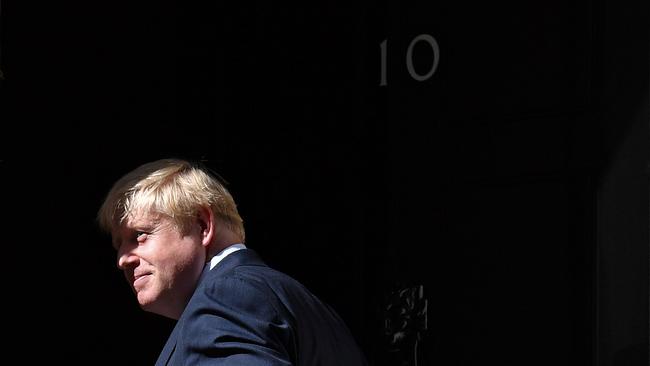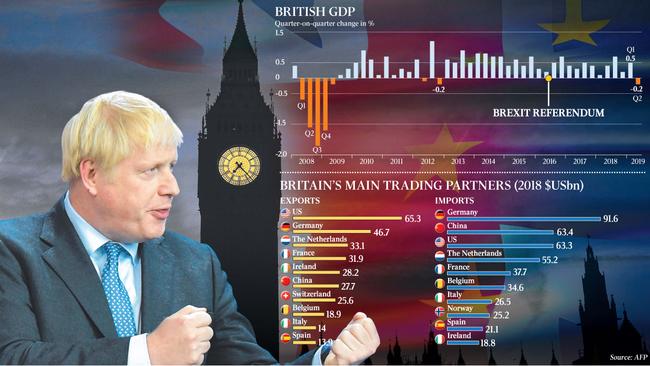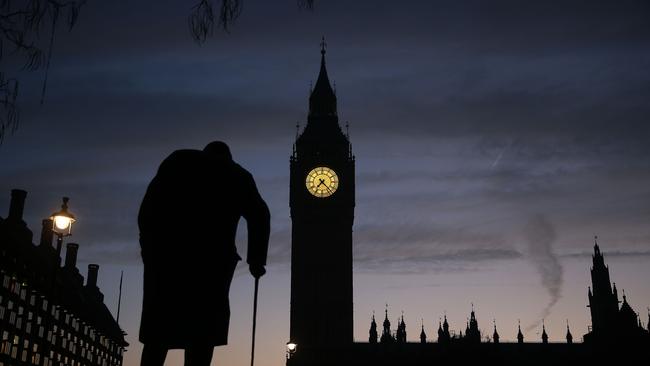Boris’ battle for Britain: how MPs can still evade a no-deal Brexit
It was Johnson’s plan to close the window for evading a no-deal; but MPs still have some options.

The pressure is rising in the battle between British Prime Minister Boris Johnson, who is determined to lead Britain out of the EU with or without a deal on October 31, and his parliament, where most MPs want to stop a no-deal Brexit.
This week opposition parties agreed that, when the Commons returned on September 3, they would try to hijack its agenda to pass a law calling for another extension of the Brexit deadline.
But a day later Johnson trumped them by announcing a long suspension of parliament, from September 11 to October 14, when a Queen’s speech will start a new session.
The Prime Minister claimed this was a normal way for a new government to set out its plans on crime, health and so on. Yet his main goal is the cynical one of shortening the time when MPs may stop a no-deal Brexit.
At almost five weeks, it will be the British parliament’s longest suspension before a Queen’s speech since 1945. The response was apoplectic. Labour leader Jeremy Corbyn labelled the move a “smash and grab on our democracy”. Commons Speaker John Bercow called it a “constitutional outrage”. Even many Tories were unhappy. Ruth Davidson, the party’s popular leader in Scotland, mindful of the threat Johnson poses to the union, is said to be on the brink of resigning.
The oddity is that a week earlier Johnson was speaking of progress towards a Brexit deal. He had junked his vow not even to talk to fellow Europeans until they dropped the Irish backstop, an insurance policy to avert a hard border in Ireland by keeping the entire UK in a Customs union with the EU.

Instead, after meeting German Chancellor Angela Merkel and French President Emmanuel Macron, he offered to propose an alternative to the backstop within 30 days. Upsetting hardline Brexiteers, he also said he would not seek other changes to the withdrawal agreement negotiated by Theresa May, his predecessor.
EU leaders listened politely. Mujtaba Rahman of the Eurasia Group consultancy says that, though sceptical of Johnson’s unspecified alternatives, they may be ready to make small changes to the backstop to reduce its scope or limit it, as first planned, to Northern Ireland. But they also back Irish leader Leo Varadkar, who insists on keeping the backstop.
They believe the withdrawal agreement struck with May goes as far as feasible to meet British interests without damaging the EU’s single market. And they are not about to surrender to Johnson’s threats of no deal, any more than they were in 2015 when Greece threatened to quit the euro.
No-deal risk rising
One conclusion from these events must be that the risk of no deal is rising fast. Two months ago Johnson talked of it being “a million to one against”. Now he says it is “touch and go”.
In political terms, no deal has appeal to Johnson, as the best chance of fending off Nigel Farage’s Brexit Party while trying to blame Brussels and Remainer “collaborators” for the mess.
On the continent, resignation to no deal is driven not only by an unwillingness to sacrifice Ireland but also by the belief that it will damage Britain far more than the EU. The impact on the British economy, which is teetering near recession, could indeed be severe. The government’s leaked Operation Yellowhammer analysis talks of possible shortages of fresh food, medicine and petrol, disruption to ports and the risk of civil unrest, especially in Northern Ireland, where trade across the border could be severely hampered.
Manufacturers fret about the effect on just-in-time supply chains of tariffs and non-tariff barriers. Farmers and fishers are worried about duties on sheep, beef and fish exports. Service businesses and the National Health Service talk of recruitment problems.
Brexiteers dismiss this as another “Project Fear”, like the prophesies of doom before the June 2016 referendum that turned out to be too gloomy. They concede that there could be bumps in the road. But they also claim that no deal would end uncertainty for businesses, be harmoniously managed by all sides and lead quickly to a new free trade deal with the EU.
As Charles Grant, of the Centre for European Reform think tank, notes, the chaos around no deal would in fact maximise the uncertainty for businesses. Far from being harmonious, it would be acrimonious, especially since Johnson says he would not pay the full £39 billion ($70bn) Brexit bill accepted by May.
And an early trade deal looks far-fetched. The EU would insist on the Brexit bill, protection of EU citizens’ rights and an Irish backstop as prerequisites. Any talks would be on a different legal basis from Article 50, which governs the current negotiations, requiring a fresh negotiating mandate, the unanimous approval of EU governments and ratification by national and regional parliaments.

MPs fight for a say
Given all this, most MPs are understandably against no deal. But can they stop it happening? Next week they will return to work after days of feverish exchanges over what to do. They are strengthened by the fact Bercow seems determined to exploit all his power as Speaker to give MPs a say, and that Johnson has a Commons majority of just one.
Yet they know that no deal is the default option in the absence of other action and that, thanks to Johnson’s suspension of parliament, time is short.
Many concede no-deal Brexiteers are better organised and more ruthless than their opponents. Maddy Thimont Jack of the Institute for Government, another think tank, reckons MPs have just enough time to legislate if they remain united. The plan is to ask Bercow for an emergency debate under Standing Order 24 and use this to follow the precedent of the Cooper-Letwin bill that was passed in March. Back then, MPs took control of the Commons agenda for a day to bring in this bill, which required the prime minister to request an extension of the original Brexit deadline of March 29. MPs also might need to suspend Standing Order 48, which says only a minister may propose acts costing public money.
Thimont Jack notes the March bill became law in less than five days, but that was partly because May chose not to obstruct it. Even if a similar bill passes the Commons in a single day, as then, it is hard to break a filibuster in the Lords, where the timetable for debate is less easily curtailed.
Another problem is that any law can require Johnson only to ask for an extension. He might do so on terms that allow him to refuse any offer from the EU, though Brussels is keen to avoid any blame for a no-deal Brexit.
These uncertainties make some MPs keen to consider a vote of no confidence in Johnson’s government. But that too is fraught with difficulties.
So are such options as trying to revoke the Article 50 Brexit application, for which there is much less support in parliament.
The harsh truth is that, although majorities of both MPs and voters are against a no-deal Brexit, an idea not even floated by Brexiteers during the referendum campaign, the timetable makes it tricky to stop, however hard parliament tries.
-
The six ways MPs can still thwart no deal
1. Emergency debate
The idea many anti-no-deal MPs are most attracted to is using the Standing Order 24 procedures for emergency debates. On Tuesday morning they would lodge a request with the Speaker for an emergency debate.
SO24 debates usually do not end in substantive, binding votes. But House of Commons Speaker John Bercow could tear up precedent and allow a vote on taking control of the Commons order paper on a given day, presumably Wednesday.
MPs would at that point try to pass, quickly, primary legislation requiring Prime Minister Boris Johnson to seek and implement a third Brexit delay. He would have to comply, but the legislation must be watertight and leave no scope for Johnson to refuse an extension or persuade the EU not to offer one.
Moreover, there is a problem with the House of Lords where there are no guillotine motions and peers can talk for as long as they like. The chamber is overwhelmingly anti-no-deal but it may run out of time in the event of a concerted filibuster attempt from the government before prorogation.
2. Vote of confidence and general election
If Labour leader Jeremy Corbyn were to call a vote of confidence in Johnson, only a simple majority would be required. At that point, under the Fixed-term Parliaments Act, a 14-day period is triggered during which others can seek to command a majority. Assuming no one else can do so in time, a general election will follow.
But this is risky for anti-no-deal MPs because Johnson could choose a polling day after October 31, ensuring that the UK leaves the EU.
3. Vote of confidence and caretaker government
The surest way of avoiding a mid-election Brexit is to use the 14 days to install a caretaker government, which would secure a Brexit delay and then call an election or a second referendum.
It is hard to see enough Conservative rebels and independents being willing to install Corbyn, even briefly, in Downing Street.
If that becomes clear early in the 14-day period, Westminster will enter a period of feverish speculation about whether others, such as Harriet Harman, Ken Clarke or Sir Keir Starmer, might be able to command a cross-party majority to avert no deal.

4. The courts
More than 70 MPs and peers have asked the Scottish courts to make an emergency ruling blocking the prorogation and yesterday anti-Brexit activist Gina Miller announced she would challenge Johnson in the courts too. It would be extraordinary if the courts intervened.
5. Humble address
Under a plan pushed by opposition parties including the Scottish National Party, the Liberal Democrats and the Greens, 47 MPs have signed an early day motion demanding a “humble address” to the Queen asking her not to prorogue parliament before November 8. But early day motions are not binding and the humble address procedure, previously used to command the release of Brexit impact assessments, is complicated.
6. Bring back May’s deal
Should Johnson make it as far as the Queen’s speech and a new session, then Bercow’s ruling this year that MPs cannot vote on the same Brexit deal twice in the same parliamentary session would no longer apply. Intriguingly this was pointed out yesterday by Harriett Baldwin, who was a minister under prime minister Theresa May and was sacked by Johnson.
With days to go before a possible no deal it is just feasible that anti-no-deal MPs will try to force another vote on May’s deal and hope to persuade Remainers that it is the lesser evil.
The Times

To join the conversation, please log in. Don't have an account? Register
Join the conversation, you are commenting as Logout